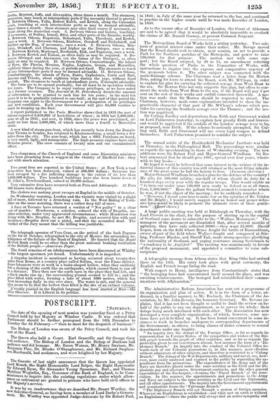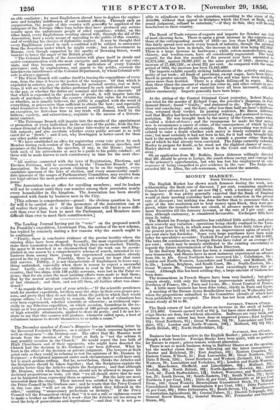The Administrative Reform Association has sent out a programme of
its organization and plan of action. It is in the form of a letter, ad- dressed, in a familiar manner, to Mr. Roebuck, the Chairman of the As- sociation, by Mr. John Revans, the honorary Secretary. Mr. Revans ex- plains, that it has not been thought so useful to limit the review on be- half of the public to any one department, as to survey the whole ; their doings being much interlaced with each other. The Association has now developed a very complete organization; of which, however, some sec- tions have yet to be filled up. It has been found convenient in some in- stances to work in branches analogous to corresponding departments of the Government ; in others, to bring classes of duties common to several departments under one inquiry.
"An inquiry into the doings of the Foreign Office, so far as regards its representation in Foreign States, of the sympathies and wishes of the Bri- tish people towards the people of other couutnes, and so far as regards the protection given to our countrymen abroad, best assumes the form of a 'Di- plomacy Branch.' An inquiry into the conduct of the Colonial Office to- wards each of our Colonial possessions is, in like manner, most effective without admixture of other subjects, and therefore is restricted to a Colony. Branch.' The doings of the War Departments, military and naval, are, how- ever, more easily analyzed and exposed to the public by separating the ex- penditure from the promotions. The expenditures of the Army and of the Navy are therefore placed under the same scrutiny as the Civil and the Di- plomatic pay and allowances, Government contracts, and the other general expenditure of the Exchequer,—forming the Fiscal Branch' of the Asso- ciation. In like manner, the appointments and promotions in the Army and Navy are subject to the same scrutiny as the Civil and the Diplomatic, and all other appointments. The inquiry into the Government appointments and nominations forms the Patronage Branch.'
"The Diplomacy Branch will act through a system of foreign agencies. Wherever an Englishman is established—and what spot on earth is without an Englishman ?—there the public will always find an active sympathy and an able coadjutor ; for most Englishmen abroad have to deplore the supine- ness and haughty indifference of our resident officials. -Through each an organization, the people of this country will generally be apprized of the intrigues of the Foreign Office long before they have produced any serious results upon the unfortunate people of other countries ; whilst, on the other hand, every Englishman residing abroad will, through the aid of the Aasothation, have a ready means of appealing to the public of this country, and of verifying his charges of diplomatic neglect. It may be thought that every Englishman joined in such a coalition will be subject to annoyance from the despotism under which he might reside ; but no Government in Europe, even though supported by the apathy of Downing Street, would venture to brave the anger of the British people. "The Colonial Branch of the Association will place itself in steady and active communication with the most energetic and intelligent of our colo- nists, and thus become possessed of the particulars of every Colonial grievance; and; by explanations, and appeal to the public, overrule the mischievous interference of the Colonial Department, by whom Colonial self- rule is always opposed.
"The Fiscal Branch will confine itself to tracing the expenditure of every sum„ from the time it leaves the pocket of the taxpayer. Of that which is expended in salaries, pay, or allowances, for personal service, real or ficti- tious, it will see whether the duties performed by each individual are equal to the pay, or whether the duties are nominal and the office a sinecure. Of that which is expended in the purchase of goods, it will inquire into the mode of purchase,—whether the country obtains fair value for its outlay, or whether, as is usually believed, the public is supplied with the worst of everything, at prices more than sufficient to obtain the best ; and especially what foundation there is for the very general assertion, that, with scarcely an exception, no first-class firm in any trade will demean itself by the bribery, cajolery, and subserviency, requisite to the success of a Govern- ment contract.
"The Patronage Branch will inspire into the merits of the appointment or promotion of every -individual in the service of the public, from the Go- vernor-General of India down to the junior tide-waiter at some small Eng- lish outport ; and also ascertain whether every public servant is as well cared for as Dowb.' ; and if not, why Dowbiggen is better cared for than
any other public servant
"We have established an office for registering every vote given by each Member during each session of the Parliament ; his address, speeches, and promises at the hustings ; his speeches, if any, in the House ; together with such of his antecedents as may be a guide to his public conduct : all these will be made known to each constituency in time for the next elec-
tion "All matters connected with the laws Of Registration, Elections, and Election Petitions, will be ascertained by the Franchise Branch ' of the Association. So that every person claiming to be on the register, every
candidate ignorant of the laws of election, and every unsuccessful candi- date ignorant of the usages of Parliamentary Committees, may receive from our legal adviser the most perfect assistance, and without the slightest ex- pense.
The Association has an office for enrolling members ; and its leaders will not be content until they can number among their associates nearly every householder in the kingdom. The Association has been stoutly supported with funds by business men in the City.
[This scheme is comprehensive—grand : the obvious question is, how far will it be carried out ? lithe promoters of the Association can at
all realize their plan, it is evident that Ministers will find it more diffi- cult than ever it has been to meet the Parliament, and Members more difficult than ever to meet their constituencies.]



























 Previous page
Previous page